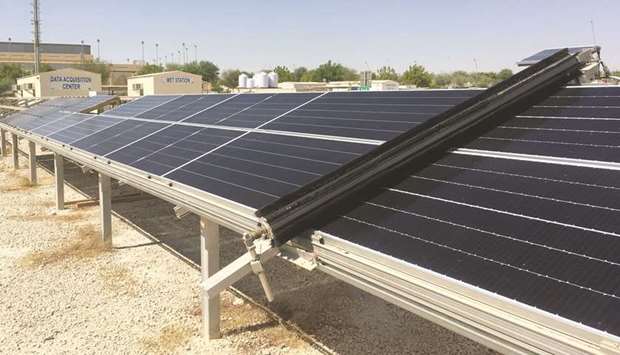The Qatar Environment and Energy Research Institute (Qeeri) at Hamad Bin Khalifa University has completed the commissioning of a major project to study the effect of an innovative method of robotic cleaning on solar photovoltaic (PV) modules in desert environments.
Managed by Qeeri’s Solar Consortium, the project is the first of its kind and cements Qeeri’s reputation as a global leader in PV research. Studies will provide real-world data on front-glass – and possibly specific functional coatings -- abrasion using commercial products in field conditions and will help PV developers to predict and tailor their cleaning strategies for solar plants in desert regions. As interest grows in the development of large solar power plants in Qatar and throughout the Middle East and North Africa, the project will also be of particular relevance to this emerging industrial sector.
A major challenge for PV performance in desert environments is soiling due to dust as well as the cementing effect of this soiling if not cleaned regularly. To quantify these effects, soiling of PV modules with different cleaning frequencies has been measured at Qeeri’s Outdoor Test Facility ( OTF) in Qatar since 2013. This long-term data set has shown that soiling causes loss of daily energy production 0.41 %/day on average, with the soiling rate significantly greater in winter than summer.
Automated cleaning of large PV plants is becoming more common in desert regions, yet its effect on PV modules is not fully known. Key concerns include the amount of abrasion on anti-reflective coatings and the effect of cleaning frequency on abrasion.
Based at Qeeri’s OTF, the study required that approximately 50 commercial PV modules derived from the latest technologies be installed on a long fixed-tilt PV row. A commercial dry PV cleaning machine runs daily on half the row, and weekly on the other half. In addition, small coupons with different coatings and reference modules with no machine cleaning are installed. Abrasion is measured by flashing in Qeeri’s new PV Reliability Lab, and coupons are analysed in the institute’s extensive Core Labs. Testing commenced in October 2020 and the data will be reported after one year, when other modules or robots can be introduced.
Dr Ben Figgis, research programme manager at Qeeri’s OTF, said: “The great thing about the Solar Consortium’s abrasion project is that it provides real-world results. The modules, cleaning machine and testing environment are exactly those found in commercial PV plants in arid regions. The data will provide a valuable link between laboratory test standards and what really happens to module coatings in the field.”
According to Dr Veronica Bermudez, senior research director of the Energy Centre at Qeeri, the results will showcase the high-quality research conducted at the Institute. “We are very excited to be leading this “first-of-its-kind” project. The study is not just relevant for Qatar but other international locations with similarly harsh environmental conditions. The solutions we will showcase will definitely have a real impact on the eventual adoption of PV technologies globally, as dusting/soiling is a serious concern.”
“Our mandate is to become a world-leading institute for energy, water and environment research and we are proud of our colleagues unrelenting commitment to this cause. This project will absolutely change the way that the world looks at PV, and we are thrilled to be at the forefront of research and development activities,” added, Dr Marc Vermeersch, executive director, Qeeri.
A major challenge for PV performance in desert environments is soiling due to dust as well as the cementing effect of this soiling if not cleaned regularly. To quantify these effects, soiling of PV modules with different cleaning frequencies has been measured at Qeeri’s Outdoor Test Facility ( OTF) in Qatar since 2013. This long-term data set has shown that soiling causes loss of daily energy production 0.41 %/day on average, with the soiling rate significantly greater in winter than summer.
Automated cleaning of large PV plants is becoming more common in desert regions, yet its effect on PV modules is not fully known. Key concerns include the amount of abrasion on anti-reflective coatings and the effect of cleaning frequency on abrasion.
Based at Qeeri’s OTF, the study required that approximately 50 commercial PV modules derived from the latest technologies be installed on a long fixed-tilt PV row. A commercial dry PV cleaning machine runs daily on half the row, and weekly on the other half. In addition, small coupons with different coatings and reference modules with no machine cleaning are installed. Abrasion is measured by flashing in Qeeri’s new PV Reliability Lab, and coupons are analysed in the institute’s extensive Core Labs. Testing commenced in October 2020 and the data will be reported after one year, when other modules or robots can be introduced.
Dr Ben Figgis, research programme manager at Qeeri’s OTF, said: “The great thing about the Solar Consortium’s abrasion project is that it provides real-world results. The modules, cleaning machine and testing environment are exactly those found in commercial PV plants in arid regions. The data will provide a valuable link between laboratory test standards and what really happens to module coatings in the field.”
According to Dr Veronica Bermudez, senior research director of the Energy Centre at Qeeri, the results will showcase the high-quality research conducted at the Institute. “We are very excited to be leading this “first-of-its-kind” project. The study is not just relevant for Qatar but other international locations with similarly harsh environmental conditions. The solutions we will showcase will definitely have a real impact on the eventual adoption of PV technologies globally, as dusting/soiling is a serious concern.”
“Our mandate is to become a world-leading institute for energy, water and environment research and we are proud of our colleagues unrelenting commitment to this cause. This project will absolutely change the way that the world looks at PV, and we are thrilled to be at the forefront of research and development activities,” added, Dr Marc Vermeersch, executive director, Qeeri.

